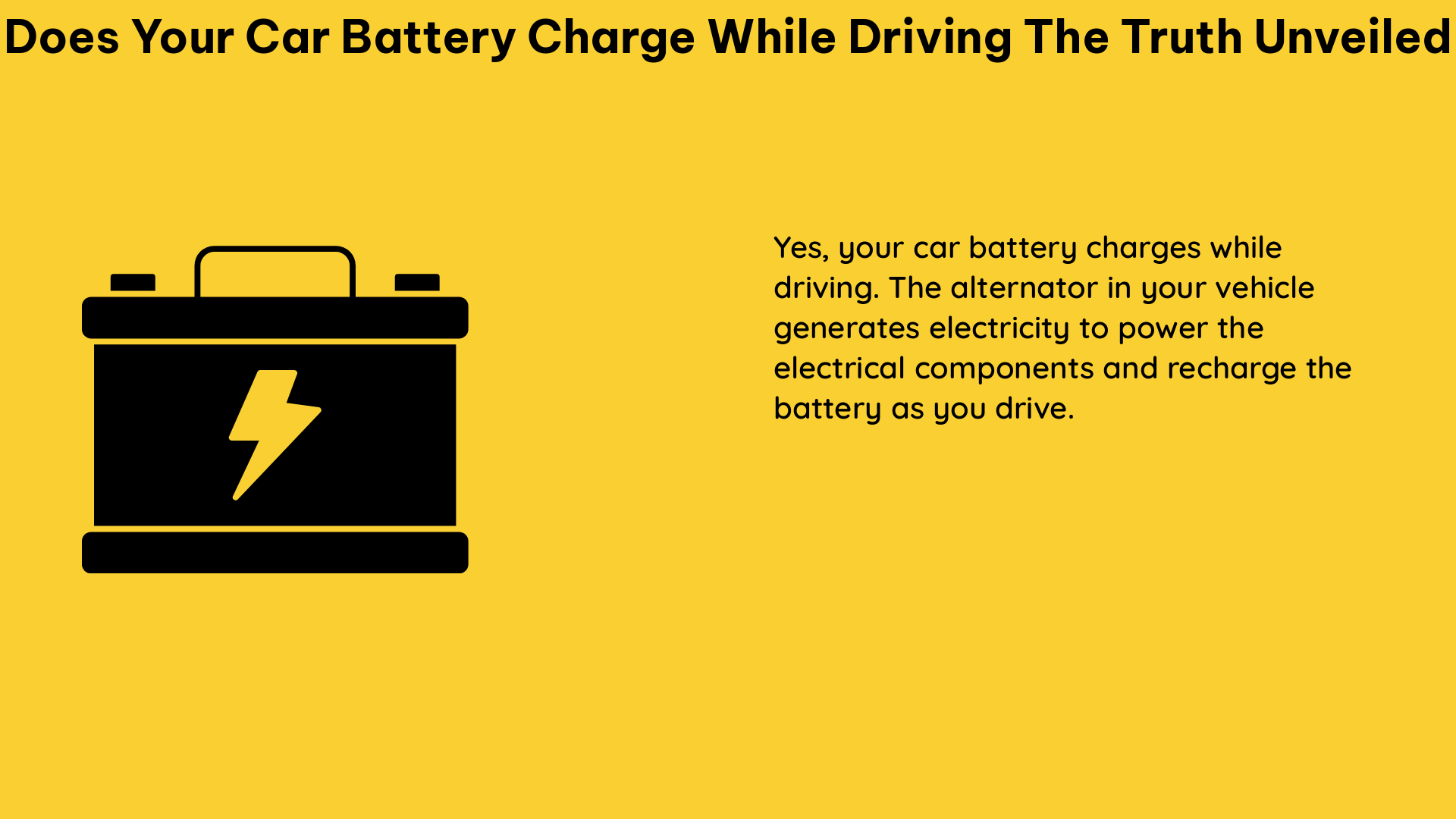The car’s electrical system is a complex network of components that work together to power the vehicle. At the heart of this system is the car battery, which provides the initial power needed to start the engine and also supplies power to the electrical systems when the engine is off. But the question remains: does the car battery charge while driving?
The Role of the Alternator in Charging the Battery
The alternator is the key component responsible for charging the car battery while driving. As the engine runs, the alternator generates electricity, which is used to charge the battery and power the car’s electrical systems.
The alternator’s output voltage is typically around 13.5 to 14.5 volts, which is higher than the battery’s voltage of around 12.6 volts when fully charged. This voltage difference allows the alternator to push current into the battery, replenishing the charge that was used to start the engine and power the electrical systems.
The alternator’s charging rate is directly proportional to the engine’s RPM. As the engine speed increases, the alternator generates more electricity, leading to a faster charging rate for the battery. However, it’s important to note that the battery will never reach 100% charge while driving, as the alternator is also powering the car’s electrical systems.
Factors Affecting Battery Charging While Driving

Several factors can influence the rate at which the car battery charges while driving:
-
Driving Speed: While many sources claim that driving at higher speeds charges the battery faster, this is not always the case. The voltage readings on a voltmeter may remain relatively constant regardless of the driving speed, as shown in a SubaruOutback.org forum post. However, higher RPMs can generate more electricity, which may lead to faster charging.
-
Electrical Load: The car’s electrical systems, such as the headlights, radio, and air conditioning, draw current from the battery. As the electrical load increases, the alternator has to work harder to both charge the battery and power these systems, which can slow down the battery charging process.
-
Battery Condition: The condition of the car battery itself can also affect the charging rate. A battery that is old, damaged, or not functioning properly may not accept a charge as efficiently as a healthy battery.
-
Alternator Condition: The alternator’s ability to generate electricity is also crucial. If the alternator is not working correctly, it may not be able to charge the battery effectively, even while driving.
Estimating Charging Time
According to Interstate Batteries, it typically takes about 4 to 8 hours of driving at highway speeds to charge a car battery. However, this is not a precise estimate, as the charging rate can vary depending on the factors mentioned above.
For a more accurate estimate, you can use the following formula:
Charging Time (hours) = (Battery Capacity (Ah) / Alternator Output (A)) x 1.2
For example, if your car has a 60 Ah battery and the alternator has an output of 60 A, the estimated charging time would be:
Charging Time = (60 Ah / 60 A) x 1.2 = 1.2 hours
It’s important to note that this formula provides a rough estimate, and the actual charging time may vary depending on the specific conditions of your vehicle.
Efficient Battery Charging
While the car’s alternator can charge the battery while driving, this process is not the most efficient way to fully recharge the battery. Plug-in battery chargers, which are designed specifically for this purpose, can charge the battery more efficiently, with estimates ranging from 10 to 24 hours for a full charge.
These chargers are able to provide a more controlled and optimized charging process, ensuring that the battery is charged safely and effectively. They also often have features like automatic shut-off and overcharge protection, which can help extend the battery’s lifespan.
Conclusion
In summary, the car battery does charge while driving, but the charging process is not as efficient as using a dedicated battery charger. The alternator generates electricity as the engine runs, which is used to charge the battery and power the car’s electrical systems. However, the battery will never reach 100% charge while driving, and the charging rate can be affected by various factors, such as driving speed, electrical load, and the condition of the battery and alternator.
For the most effective and efficient battery charging, it’s recommended to use a plug-in battery charger, which can fully recharge the battery in a shorter amount of time and with better control over the charging process.
References:
– Reddit post on car battery charging while driving
– Interstate Batteries blog post on charging car batteries
– SubaruOutback.org forum post on driving speed and battery charging
– HubPages article on jump-starting car batteries
– Knoxville Smart Cities presentation on car electrical systems

The lambdageeks.com Core SME Team is a group of experienced subject matter experts from diverse scientific and technical fields including Physics, Chemistry, Technology,Electronics & Electrical Engineering, Automotive, Mechanical Engineering. Our team collaborates to create high-quality, well-researched articles on a wide range of science and technology topics for the lambdageeks.com website.
All Our Senior SME are having more than 7 Years of experience in the respective fields . They are either Working Industry Professionals or assocaited With different Universities. Refer Our Authors Page to get to know About our Core SMEs.